英语修辞鉴赏2
高级英语第二册修辞(完整版)

Lesson11 We can batten down and ride it out.--metaphor2 Everybody out the back door to the cars!--elliptical sentence3 Telephone poles and 20-inch-thick pines cracked like guns as the winds snapped them.-simile4 Several vacationers at the luxurious Richelieu Apartments there held a hurricane party to watch the storm from their spectacular vantage point--transferred epithet5 Strips of clothing festooned the standing trees, and blown down power lines coiled like black spaghetti over the roads-metaphor, simile Lesson21 The little crowd of mourners –all men and boys, no women—threaded their way across themarket place between the piles of pomegranates and the taxis and the camels, wailing a short chant over and over again.—elliptical sentence2 A carpenter sits cross-legged at a prehistoric lathe, turningchair-legs at lightning speed.—historical present, transferred epithet3 Still, a white skin is always fairly conspicuous.—synecdoche4 As the storks flew northward the Negroes were marching southward—a long, dusty column,infantry, screw-gun batteries, adnthen more infantry, four or five thousand men in all, winding up the road with a clumping of boots and a clatter of iron wheels.—onomatopoetic wordssymbolism5 Not hostile, not contemptuous, not sullen, not even inquisitive.—elliptical sentence6 And really it was like watching a flock of cattle to see the long column, a mile or two miles of armed men, flowing peacefully up the road, while the great white birds drifted over them in the opposite direction, glittering like scraps of paper.—simileLesson31 The fact that their marriages may be on the rocks, or that their love affairs have been brokenor even that they got out of bed on the wrong side is simply not a concern.—metaphor2 They are like the musketeers of Dumas who, although they livedside by side with each other,did not delve into, each other’s lives or the recesses of their thoughts and feelings.—simile3 It was on such an occasion te other evening, as the conversation moved desultorily here andthere, from the most commonplace to thoughts of Jupiter, without and focus and with no needfor one that suddenly the alchemy of conversation took place, andall at once ther was afocus.—metaphor4 The Elizabethans blew on it as on a dandelion clock, and its seeds multiplied, and floated tothe ends of the earth.—simile5 Even with the most educated and the most literate, the King’s English slips and slides inconversation.—metaphor, alliteration6 When E.M.Forster writes of ―the sinister corridor of our age,‖ we sit up at the vividness of thephrase, the force and even terror in the image.—metaphorLesson41 Let the word go forth from this time and place, to friend and foe alike, that the torch has beenpassed to a new generation of Americans, born in this century, tempered by war, disciplinedby a hard and bitter peace, proud of our ancient heritage, and unwilling to witness or permitthe slow undoing of these human rights to which this nation has always been committed, andto which we are committed today at home and around the world.—alliteration2 Let every nation know, whether it wishes us well or ill, that we shall pay any price, bear anyburden, meet any hardship, suppor any friend, oppose any foe to assure the survival and thesuccess of liberty.—parataxis consonance3 United, there is little we cannot do in a host of co-operative ventures. Divided, there is littlewe can do, for we dare not meet a power ful challenge at odds and split asunder.—antithesis4 …in the past, those who foolishly sought power by riding the back of the tiger ended upinside.—metaphor5 Let us never negotiate out of fear, but let us never fear to negotiate.—regression6 All this will not be finished in the first one hundred days.—historical allusion, climax7 And so, my fellow Americans ask not what your country can do for you; ask what you can dofor your country.—contrast, windingLesson51 Charles Lamb, as merry and enterprising a fellow as you will meet in a month of Sundays,unfettered the informal essay with his memorable Old China and Dream’sChildren.—metaphor2 Read, then, the following essay which undertakes to demonstrate that logic, far from being adry, pedantic discipline, is a living, breathing thing, full of beauty, passion, andtrauma.—metaphor, hyperbole3 Back and forth his head swiveled, desire waxing, resolution waning.—antithesis4 What’s Polly to me, or me to Polly?—parody5 This loomed as a project of no small dimensions, and at first I was tempted to give her backto Petey—understatement6 Maybe somewhere in the extinct crater of her mind, a few embers still smoldered. Maybesomehow I could fan them into flame.—metaphor, extended metaphor Lesson61 As in architecture, so in automaking.—elliptical sentenceLesson71 Here was the very heart of industrial America, the center of its most lucrative andcharacteristic activity, the boast and pride of the richest and grandest nation ever seen onearth—and here was a scene so dreadfully hideous, so intolerably bleak and forlorn that itreduced the whole aspiration of man to a macabre and depressing joke.—metaphor,hyperbole, antithetical contrast2 Here was wealth beyond computation, almost beyond imagination—and here were humanhabitations so abominable that they would have disgraced a race of alley cats.—hyperbole,antithetical contrast3 The country itself is not uncomely, despite the grime of the endless mills.—litotes,understatement4 Obviously, if ther were architects of any professional sense or dignity in the region, theywould have perfected a chalet to hug the hillsides—a chalet with a high pitched roof, to throwoff the heavy winter snows, but still essentially a low and clinging building, wider than it wastall.—sarcasm5 And one and all they are streaked in grime, with dead and eczematous patches of paintpeeping through the streaks.—metaphor6 When it has taken on the patina of the mills it is the color of an egg long past all hope orcaring.—ridicule, irony, metaphor7 I award this championship only after laborious research and incessant prayer.—irony8 Safe in a Pullman, I have whirled through the gloomy, God-forsaken villages of Iowa andLansas, and the malarious tidewater hamlets of Georgia.—antonomasia9 It is as if some titanic and aberrant genius, uncompromisingly inimical to man, had devotedall the ingenuity of Hell to the making of them.—hyperbole, irony10 They like it as it is: beside it, the Parthenon would no doubt offend them.—irony11 It is that of a Presbyterian grinning.—metaphorLesson81 One speaks of ―human relations‖ and one means the most inhuman relations, those betweenalienated automatons; one speaks of happiness and means the perfect routinization which hasdriven out the last doubt and all spontaneity.—parallismLesson91 In the streets between houses with red roofs and painted walls, between old mossgrowngardens and under avenues of trees, past great parks and public buildings,processions.—periodic sentence2 The air of morning was so clear that the snow stil crowning the Eighteen Peaks burned withwhite-gold fire across the miles of sunlit air, under the dark blue of the sky.—metaphor3 In the silence of the broad green meadows one could hear the music winding through the citystreets, farther and nearer and ever approaching, a cheerful faint sweetness of the air that fromtime to time trembled and gathered together and broke out into the great joyous clanging ofthe bells.—periodic sentence4 Some of them understand why, and some do not, but they all understand that their happiness,the beauty of their city, the tenderness of their friendships, the health of their children, thewisdom of their scholars, the skill of their makers, even the abundance of their harvest and thekindly weathers of their skies, depend wholly on this child’s abominable misery.—parallelconstruction5 Indeed, after so long it would probably be wretched without walls about it to protect it ,anddarkness for its eyes, and its own excrement to sit in.—parallel constructionLesson101 The slightest mention of the decade brings nostalgic recollections to the middle-aged andcurious questionings by the young: memories of the deliciouslyillicit thrill of the first visit toa speakeasy, of the brave denunciationg of Puritan morality, and of the fashionableexperimentations in amour in the parked sedan on a country road; questions about the naughty,jazzy parties, the flask-toting‖ sheik‖, and the moral andstylistic vagaries of the ―flapper‖ andthe ―drug-store cowboy‖.—transferred epithet2 Second, in the United States it was reluctantly realized by some—subconsciously if notopenly—that our country was no longer isolated in either politics or tradition and that we hadreached an international stature that would forever prevent us from retreating behind theartificial walls of a provincial morality or the geographical protection of our two borderingoceans.—metaphor3 War or no war, as the generations passed, it became increasingly difficult for our youngpeople to accept standards of behavior that bore no relationship to the bustling businessmedium in which they were expected to battle for success.—metaphor4 The war acted merely as a catalytic agent in this breakdown of the Victorian social structure,and by precipitationg our young people into a pattern of mass murder it released theirinhibited violent energies which, after theshooting was over, were turned in both Europe andAmerica to the destruction of an obsolescent nineteenth century society.—metaphor5 The prolonged stalemate of 1915-1916,the increasing insolence of Germany toward theUnited States, and our official reluctance to declare our status as a belligerent were intolerableto many of our idealistic citizens, and with typical American adventurousness enhancedsomewhat by the strenuous jingoism of Theodore Roosevelt, our young men began to enlistunder foreign flags.—metonymy6 Their energies had been whipped up and their naïveté destroyed by the war and now, in sleepyGopher Prairies all over the country, they were being asked to curb those energies and resumethe pose of self-deceiving Victorian innocence that they now felt to be as outmoded as thenotion that their fighting had ―made the world safe for democracy‖.—metaphor7 After the war, it was only natural that hopeful young writers, their minds and pens inflamedagainst war, Babbittry, and ―Puritanical‖ gentility, should flock to the traditional artisticcenter(where living was still cheap in 1919)to pour out their new-found creative strength, totear down the old world, to flout ht morality of their grandfathers, and to give all to art, love,and sensation.—metonymy synecdoche8 Younger brothers and sisters of the war generation, who had been playing with marbles anddolls during the battles of Belleau Wood and Chateau-Thierry, and who had suffered no realdisillusionment or sense of loss, now began to imitate the manners of their elders and playwith the toys of vulgar rebellion.—metaphor9 These defects would disappear if only creative art were allowed to show the way to betterthings, but since the country was blind and deaf to everything save the glint and ring of thedollar, there was little remedy for the sensitive mind but to emigrate to Europe where ―they dothings better.‖—personification, metonymy ,synecdocheLesson111 This is because there are fewer fanatical believers among the English, and at the same time,below the noisy arguments, the abuse and the quarrels, there is a reservoir of instinctivefellow-feeling, not yet exhausted though it may not be filling up.—metaphor2 But there are not may of these men, either on the board or the shop floor, and they arecertainly not typical English.—metaphor3 Some cancer in their character has eaten away their Englishness.—metaphor4 A further necessary demand, to feed the monster with higher and higher figures and larger andlarger profits, is for enormous advertising campaigns and brigades of razor-keensalesmen.—metaphor5 It is a battle that is being fought in the minds of the English. It is between Admass, which hasalready conquered most of the Western world, and Englishness, ailing and impoverished, in noposition to receive vast subsidies of dollars, francs, Deutschmarks and the rest, for publicrelations and advertising campaigns.—personification6 Against this, at least superficially, Englishness seems a poor shadowy show—a faint pencilsketch beside a poster in full color –belonging as it really does to the invisible inner world,merely offering states of mind in place of that rich variety of things. But then while things areimportant, states of mind are even more important.—metaphor7 It must have some moral capital to draw upon, and soon it may be asking for anoverdraft.—metaphor8 Bewildered, they grope and mess around because they have fallen between two stools, the oldharsh discipline having vanished and the essential new self-discipline either not understood orthought to be out of reach.—metaphor9 Recognized political parties are repertory companies staging ghostly campaigns,and all that isreal between them is the arrangement by which one set of chaps take their turn at ministerialjobs while the other et pretend to be astounded and shocked and bring in talk ofruin.—metaphor10 Englishness cannot be fed with the east wind of a narrow rationality, the latest figures of profitand loss, a constant appeal to self-interest.—metaphor11 And this is true, whether they are wearing bowler hats or ungovernable mops ofhair.—metonymyLesson121 When it did, I like many a writer before me upon the discoverythat his props have all beenknocked out from under him, suffered a species of breakdown ad was carried off to themountains of Switzerland.—metaphor2 Tere, in that absolutely alabaster landscape armed with two Bessie Smith records and atypewriter I began to try to recreate the life that I had first known as a child and from which Ihad spent so many years in flight.—metaphor3 Once I was able to accept my role—as distinguished, I must say, from my ―place‖—in theextraordinary drama which is America, I was released from theillusion that I hatedAmerica.—metaphor4 It is not meant, of course, to imply that it happens to them all, for Europe can be verycrippling too; and, anyway, a writer, when he has made his first breakthrough, has simply wona crucial skirmish in a dangerous, unending and unpredictable battle.—metaphor5 Whatever the Europeans may actually think of artists, they have killed enough of them off bynow to know that they are as real—and as persisten—as rain, snow, taxes orbusinessmen.—simile6 In this endeavor to wed the vision of the Old World with that of the New, it is the writer, notthe statesman, who is our strongest arm.—metaphorLesson131 I am asked whether I know that there exists a worldwide movement for the ablition of capitalpunishment which has every where enlisted able men of every profession, including the law. Iam told that the death penalty is not only inhuman but also unscientific, for rapists andmurderers are really sick people who should be cured, not killed. I am invited to use myimagination and acknowledge the unbearable horror of every form of execution.—parataxis2 Under such a law, a natural selection would operate to remove permanently from the scenepersons who, let us say, neglect argument in favor of banging on the desk with theirshoe.—metonymyLesson141 A market for knowingness exists in New York that doesn’t existforknowledge.—paregmenon2 The condescending view from the fiftieth floor of the city’s crowds below cuts these peopleoff from humanity.—transferred epithet3 So much of well-to-do America now lives antiseptically in enclaves, tranquil and luxurious,that shut out the world.—synecdoche, metaphor。
英语中19种修辞手法的全部解释和例句解析

8.Parallelism 排比, 平行
这种修辞法是把两个或两个以上的结构大 体相同或相似,意思相关,语气一致的短语. 句子排列成串,形成一个整体. 1>.No one can be perfectly free till all are free; no one can be perfectly moral till all are moral; no one can be perfectly happy till all are happy. 所有的人自由後,才能完全自由;所有的 人都有道德,才能完全合乎道德;所有的 人都幸福了,才能真正幸福。
2.Metaphor 隐喻,暗喻
隐喻是简缩了的明喻,是将某一事物 的名称用于另一事物,通过比较形成. 例如: 1>.Hope is a good breakfast, but it is a bad supper. 2>.Some books are to be tasted, others swallowed, and some few to be chewed and digested.
这种修辞是将一系列词语按照意念的大 小.轻重.深浅.高低等逐层渐进,最后达到 顶点.可以增强语势,逐渐加深读者印象. 例如: 1>.I am sorry, I am so sorry, I am so extremely sorry.
19.Anticlimax 渐降法
The duties of a soldier are to protect his country and peel potatoes.
11.Iro误时,用赞同过 失的说法,而在表扬时,则近乎责难的说 法. 1>.It would be a fine thing indeed not knowing what time it was in the morning. 早上没有时间观念还真是一件 好事啊(真实含义是应该明确早上的时 间观念)
英语修辞学Ss' handouts2

English Rhetoric Chapter 2Reading 3I am more than angry. I did not give birth to my one and onlyson to have him snatched away from me 18 years later. My child has been loved and cared for and taught right from wrong and will not be fed into any egomaniac’s war machine.Our 18-to 25-year-olds have not brought this world to its present sorry state. Men over the age of 35, down through the centuries, have brought us here, and we women have been in silent accord.Well, this is one woman, one mother, who says No. I did not go through the magnificent agony of childbirth to have that glorious young life snuffed out.Until the presidents, premiers, supreme rulers, politburos, senators and congressmen of the world are ready to physically, as opposed to verbally, lead the world into combat, they can bloody well forget my child.Unite mothers!Don’t throw your sons and daughters away.Sometime, somewhere, women must say No.No. No. No. No. No. Never my child.(Louise M. Saylor, Washington Post, Jan.28, 1980)Reading 4In informal situations, we often overgeneralize from the facts: “She’s never on time”; “Advertising is only a pack of lies.”A little consideration shows us that in reality all-or-none, black-or-white situations are rare; reality is more accurately described in terms of finer shadings and degrees. Most readers are aware of this, and although they will accept and make statements like the above uncritically enough in conversations, they are suspicious of them in writing.Be especially cautious in using terms like “all”, “always”, “everybody”, “nobody”, “never”, “none”, “only”and “most”. Before making such all-inclusive statements, make sure that they are justified. If there are any exceptions to some assertion you make, modify your language to make it more accurate. Don’t say that all young people have such and such a disadvantage: “some” or “many” might be more accurate. Before you say that almost all the schools in that area have very poor educational facilities,ascertain from some reliable source whether more than 80 percent actually do;otherwise you are not really justified in saying it. Keep in mind that the English vocabulary provides you with a wealth of qualifying terms (some, few, often, to name only a few) and choose those that most accurately describe the number, extent, and frequency of the facts you are asserting.Exercise twoⅠ. Identify the reasoning pattern used in each of the following passages.1.There seems to be a general assumption that brilliant people cannotstand routine, and that they need a varied, exciting life in order to dotheir best. It is also assumed that dull people are particularly suited fordull work. We are told that the reason present-day young people protestso loudly against the dullness of factory jobs is that they are bettereducated and brighter than the youth of the past. (Eric Hoffer, “DullWork”)2.The cases of Adolf Beck, of Oscar, of the unhappy Brooklyn bank tellerwho vaguely resembled a forger and spent eight years in Sing Sing[State Prison in New Y ork] only to “emerge”a broken, friendless,useless, “compenstated” man—all these, if the dignity of the individualhas any meaning, had better have been dead before the prison door everopened for them. This is what counsel always says to the jury in thecourse of a murder trial and counsel is right: far better to hang this manthan “give him life.”(Jacques Barzun, “In Favor of Capital Punishment”)Ⅱ. Fill in each blank with an appropriate preposition.Emotional fallacies appeal directly (1)_______ the human frailties(2)_______ the audience: some (3)________their prejudices, some (4)________ their vanity, some (5)________their national pride, others(6)_______their desire to emulate people they admire. Because(7)______this, they exert great persuasive force. These fallacies should beavoided (8)______writing (9)______essentially the same reason that you shun slanting: they deceive your readers. Remember how often you have felt cheated because an advertiser convinced you to buy an expensive, ineffective product (10)______ playing (11)______your desire to be attractive (12)______the opposite sex. Using such tactics(13)_______argument can only have short-range effectiveness; yourcommitment should be to make a lasting impression (14)______your readers.(Michael E. Adelstein and Jean G..Pival: The Writing Commitment, 2nd ed. 1980, pp. 328-329)III. An elementary acquaintance with the general patterns of inference can help writers in two ways.,1.It can make them aware of the premises that underlie an argument.Analyze the following example and provide its major premise:“There is a school ahead. Here we come across a traffic sign onwhich there are school children.”2.It can also help a writer check the validity of his line of reasoning.Examine the following example, point out its fallacy and provide possible remedies:Some elected officials are bribe-takers.Smith is an elected official.Therefore, Smith is a bribe-taker.IV. Identify the fallacies of pathos in each of the following paragraphs as “Ad Hominen”, “Name calling”, or “Bandwagon Appeal”with the help of a dictionary.1.Many advertising slogans urge readers to buy something so that they becomeassociated with the majority of people or with a particular prestigious group: “Beer belongs,”“Camels aren’t for everybody (but then, they don’t try to be),”“John the Pepsi generation,”“The car for the people who think,”“长龙,只为少数派的宣言”.2.When challenged by an opponent to discuss military spending, a politicianaccuses the opponent of alcoholism.3.He (the male) is a half dead, unresponsive lump, incapable of giving orreceiving pleasure or happiness; consequently he is at best an utter bore, an inoffensive blob, since only those capable of absorption in others can be charming.。
英语中所有26种修辞手法的全部解释和例句

英语修辞手法总结Figures of speech (修辞)are ways of making our language figurative. When we use words in other than their ordinary or literal sense to lend force to an idea, to heighten effect, orto create suggestive imagery, we are said to be speaking or writing figuratively. Now we are going to talk about some common forms of figures of speech.1) Simile:(明喻)It is a figure of speech which makes a comparison between two unlike elements having at least one quality or characteristic (特性)in common. To make the comparison, words like as, as...as, as if and like are used to transfer the quality we associate with one to the other. For example, As cold waters to a thirsty soul, so is good news from a far country.2) Metaphor:(暗喻)It is like a simile, also makes a comparison between two unlike elements, but unlike a simile, this comparison is implied rather than stated. For example, the worldis a stage.3) Analogy: (类比)It is also a form of comparison, but unlike simile or metaphor which usually uses comparison on one point of resemblance, analogy draws a parallel between two unlike things that have several common qualities or points of resemblance.4) Personification: (拟人)It gives human form of feelings to animals, or life and personal attributes(赋予) to inanimate(无生命的) objects, or to ideas and abstractions(抽象). For example, the wind whistled through the trees.5) Hyperbole: (夸张) It is the deliberate use of overstatement or exaggeration to achieve emphasis. For instance, he almost died laughing.6) Understatement: (含蓄陈述) It is the opposite of hyperbole, or overstatement. Itachieves its effect of emphasizing a fact by deliberately(故意地) understating it,impressing the listener or the reader more by what is merely implied or left unsaid than by bare statement. For instance, It is no laughing matter.7) Euphemism: (委婉) It is the substitution of an agreeable or inoffensive(无冒犯) expression for one that may offend or suggest something unpleasant. For instance, we refer to "die" as " pass away".8) Metonymy (转喻)It is a figure of speech that has to do with the substitution of the mane of one thing for that of another. For instance, the pen (words) is mightier than the sword (forces).9) Synecdoche (提喻) It is involves the substitution of the part for the whole, or thewhole for the part. For instance, they say there's bread and work for all. She was dressedin silks.10) Antonomasia (换喻)It has also to do with substitution. It is not often mentioned now, though it is still in frequent use. For example, Solomon for a wise man. Daniel for a wise and fair judge. Judas for a traitor.11) Pun: (双关语) It is a play on words, or rather a play on the form and meaning of words. For instance, a cannon-ball took off his legs, so he laid down his arms. (Here "arms" has two meanings: a person's body; weapons carried by a soldier.)12) Syllepsis: (一语双叙) It has two connotations.In the first case, it is a figure by which a word, or a particular form or inflection of a word, refers to two or more words in the same sentence, while properly applying to or agreeing with only on of them in grammar or syntax(句法). For example, He addressed you and me, and desired us to follow him. (Here us is used to refer to you and me.)In the second case, it a word may refer to two or more words in the same sentence. For example, while he was fighting , and losing limb and mind, and dying, others stayed behind to pursue education and career. (Here to losing one's limbs in literal; to lose one's mindis figurative, and means to go mad.)13) Zeugma: (轭式搭配) It is a single word which is made to modify or to govern two or more words in the same sentence, wither properly applying in sense to only one of them, orapplying to them in different senses. For example, The sun shall not burn you by day, nor the moon by night. (Here noon is not strong enough to burn)14) Irony: (反语) It is a figure of speech that achieves emphasis by saying the opposite of what is meant, the intended meaning of the words being the opposite of their usual sense. For instance, we are lucky, what you said makes me feel real good.15) Innuendo: (暗讽) It is a mild form of irony, hinting in a rather roundabout (曲折)way at something disparaging(不一致) or uncomplimentary(不赞美) to the person or subject mentioned. For example, the weatherman said it would be worm. He must take his readings in a bathroom.16) Sarcasm: (讽刺) It Sarcasm is a strong form of irony. It attacks in a taunting and bitter manner, and its aim is to disparage, ridicule and wound the feelings of the subject attacked. For example, laws are like cobwebs, which may catch small flies, but let wasps break through.17) Paradox: (似非而是的隽语) It is a figure of speech consisting of a statement or proposition which on the face of it seems self-contradictory, absurd or contrary to established fact or practice, but which on further thinking and study may prove to be true, well-founded, and even to contain a succinct point. For example more haste, less speed.18) Oxymoron: (矛盾修饰) It is a compressed paradox, formed by the conjoining(结合) of two contrasting, contradictory or incongruous(不协调) terms as in bitter-sweet memories, orderly chaos(混乱) and proud humility(侮辱).19) Antithesis: (对照) It is the deliberate arrangement of contrasting words or ideas in balanced structural forms to achieve emphasis. For example, speech is silver; silence is golden.20) Epigram: (警句) It states a simple truth pithily(有利地) and pungently(强烈地). It is usually terse and arouses interest and surprise by its deep insight into certain aspects of human behavior or feeling. For instance, Few, save the poor, feel for the poor.21) Climax: (渐进) It is derived from the Greek word for "ladder" and implies the progression of thought at a uniform or almost uniform rate of significance or intensity,like the steps of a ladder ascending evenly. For example, I came, I saw, I conquered.22) Anti-climax or bathos: (突降)It is the opposite of Climax. It involves stating one's thoughts in a descending order of significance or intensity, from strong to weak, from weighty to light or frivolous. For instance, But thousands die, without or this or that, die, and endow(赋予) a college, or a cat.23) Apostrophe: (顿呼) In this figure of speech, a thing, place, idea or person (dead or absent) is addressed as if present, listening and understanding what is being said. For instance, England! awake! awake! awake!24) Transferred Epithet: (转类形容词) It is a figure of speech where an epithet (anadjective or descriptive phrase) is transferred from the noun it should rightly modify(修饰) to another to which it does not really apply or belong. For instance, I spent sleeplessnights on my project.25) Alliteration: (头韵) It has to do with the sound rather than the sense of words for effect. It is a device that repeats the same sound at frequent intervals(间隔) and since the sound repeated is usually the initial consonant sound, it is also called "front rhyme". For instance, the fair breeze blew, the white foam flew, the furrow followed free.26) Onomatopoeia: (拟声) It is a device that uses words which imitate the sounds made by an object (animate or inanimate), or which are associated with or suggestive(提示的) of some action or movementExplanation version1一、什么是修辞格修辞格(figures of speech)是提高语言表达效果的语言艺术。
(完整版)英语中的修辞手法
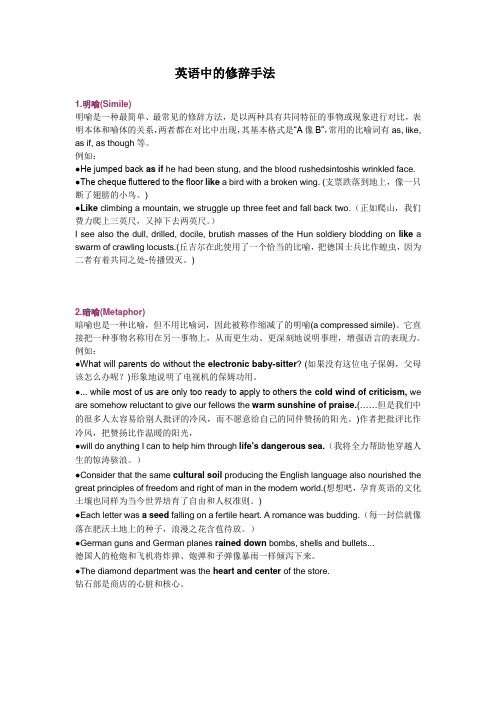
英语中的修辞手法1.明喻(Simile)明喻是一种最简单、最常见的修辞方法,是以两种具有共同特征的事物或现象进行对比,表明本体和喻体的关系,两者都在对比中出现,其基本格式是“A像B”,常用的比喻词有as, like, as if, as though等。
例如:●He jumped back as if he had been stung, and the blood rushedsintoshis wrinkled face.●The cheque fluttered to the floor like a bird with a broken wing. (支票跌落到地上,像一只断了翅膀的小鸟。
)●Like climbing a mountain, we struggle up three feet and fall back two.(正如爬山,我们费力爬上三英尺,又掉下去两英尺。
)I see also the dull, drilled, docile, brutish masses of the Hun soldiery blodding on like a swarm of crawling locusts.(丘吉尔在此使用了一个恰当的比喻,把德国士兵比作蝗虫,因为二者有着共同之处-传播毁灭。
)2.暗喻(Metaphor)暗喻也是一种比喻,但不用比喻词,因此被称作缩减了的明喻(a compressed simile)。
它直接把一种事物名称用在另一事物上,从而更生动、更深刻地说明事理,增强语言的表现力。
例如:●What will parents do without the electronic baby-sitter? (如果没有这位电子保姆,父母该怎么办呢?)形象地说明了电视机的保姆功用。
●... while most of us are only too ready to apply to others the cold wind of criticism, we are somehow reluctant to give our fellows the warm sunshine of praise.(……但是我们中的很多人太容易给别人批评的冷风,而不愿意给自己的同伴赞扬的阳光。
英语作文中的常见修辞手法
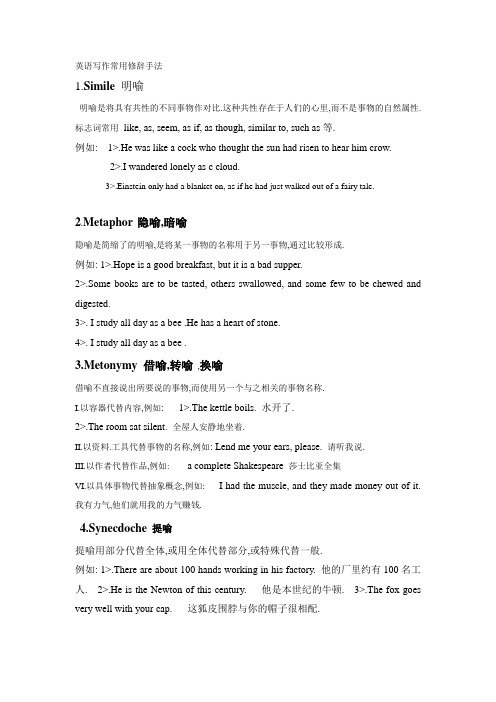
英语写作常用修辞手法1.Simile明喻明喻是将具有共性的不同事物作对比.这种共性存在于人们的心里,而不是事物的自然属性. 标志词常用like, as, seem, as if, as though, similar to, such as等.例如: 1>.He was like a cock who thought the sun had risen to hear him crow.2>.I wandered lonely as c cloud.3>.Einstein only had a blanket on, as if he had just walked out of a fairy tale.2.Metaphor隐喻,暗喻隐喻是简缩了的明喻,是将某一事物的名称用于另一事物,通过比较形成.例如: 1>.Hope is a good breakfast, but it is a bad supper.2>.Some books are to be tasted, others swallowed, and some few to be chewed and digested.3>. I study all day as a bee .He has a heart of stone.4>. I study all day as a bee .3.Metonymy 借喻,转喻,换喻借喻不直接说出所要说的事物,而使用另一个与之相关的事物名称.I.以容器代替内容,例如: 1>.The kettle boils. 水开了.2>.The room sat silent. 全屋人安静地坐着.II.以资料.工具代替事物的名称,例如: Lend me your ears, please. 请听我说.III.以作者代替作品,例如: a complete Shakespeare 莎士比亚全集VI.以具体事物代替抽象概念,例如: I had the muscle, and they made money out of it. 我有力气,他们就用我的力气赚钱.4.Synecdoche提喻提喻用部分代替全体,或用全体代替部分,或特殊代替一般.例如: 1>.There are about 100 hands working in his factory. 他的厂里约有100名工人. 2>.He is the Newton of this century. 他是本世纪的牛顿. 3>.The fox goes very well with your cap. 这狐皮围脖与你的帽子很相配.5.Personification 拟人拟人是把生命赋予无生命的事物.例如: 1>.The night gently lays her hand at our fevered heads.2>.I was very happy and could hear the birds singing in the woods.6.Irony 反语反语指用相反意义的词来表达意思的作文方式.如在指责过失.错误时,用赞同过失的说法,而在表扬时,则近乎责难的说法.例如: 1>.It would be a fine thing indeed not knowing what time it was in the morning. 2>"Of course, you only carry large notes, no small change on you. "the waiter said to the beggar..Allegory讽喻,比方这是一种源于希腊文的修辞法,意为"换个方式的说法".它是一种形象的描述,具有双重性,表层含义与真正意味的是两回事.例如: 1>.Make the hay while the sun shines.2>.It's time to turn plough into sword.7.Hyperbole 夸张overstatement understatement夸张是以言过其实的说法表达强调的目的.它可以加强语势,增加表达效果..例如: 1>.I beg a thousand pardons.2>.Love you. You are the whole world to me, and the moon and the stars.3>.When she heard the bad news, a river of tears poured out.8.Euphemism 委婉,婉辞法婉辞法指用委婉,文雅的方法表达粗恶,避讳的话. 例如:1>.He is out visiting the necessary. 他出去方便一下.2>.His relation with his wife has not been fortunate. 他与妻子关系不融洽.3>.Deng Xiaoping passed away in 19979. 移位修饰transferred epithet将本应该用来修饰某一类名词的修饰语用来修饰另一类名词。
《英语修辞学》第二章
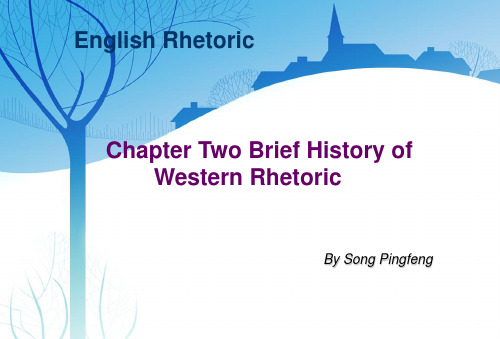
English Rhetoric
Chapter Two Brief History of Western Rhetoric
By Song Pingfeng
Page 9
/NewInfor/html/30370.htm • 拉斐尔最著名的壁画是为梵蒂冈宫绘制的《雅典学院》。这幅巨型壁画把古希腊以来
的50多个著名的哲学家和思想家聚于一堂,包括柏拉图、亚里士多德、苏格拉底、 毕达哥拉斯等,以此歌颂人类对智慧和真理的追求,赞美人类的创造力。
• 然而,柏拉图对修辞的看法并非一成不变。海德格尔在1924-1925年讲授 《智者篇》时提出,柏拉图的修辞观念有一个演变的过程,其轨迹可以通过 比较三篇对话勾勒出来(Brogan:3-15)。《高尔吉亚篇》代表了早期柏拉 图全盘否定修辞的态度;海德格尔认为,在《智者篇》中,柏拉图的态度有 了重大变化,转而相信修辞对“不在”(non-being)或者说“存在”之外的 领域的关注应当在哲学中占据一席之地,辩证(dialectic)能够克服修辞的 欺骗倾向,使之为哲学服务;《斐德若篇》(Phaedrus)则是发生这一转变的 关 键 场 所 。 在 这 篇 对 话 中 , 柏 拉 图 着 重 探 讨 了 真 理 ( aletheia ) 与 语 言 (logos)的关系。
Page 6
1.4 Some Ancient Greek Rhetoricians and their theory
(1). Corax (科拉克斯)
Corax of Syracuse and his students Tisias(蒂西亚斯,有名的捉刀人,专 门为诉讼者撰写诉状) were the first rhetoricians in history. His theory: the first is a theory of how arguments should be developed from probabilities; the second is their first concept of organization of a message. According to Corax, legal arguments should consist of four parts: introductory, explanation, argumentation and conclusion. (Corax 将法律演说分成四个部分:前言,解释,论辩和结论。)
高级英语第二册修辞汇总
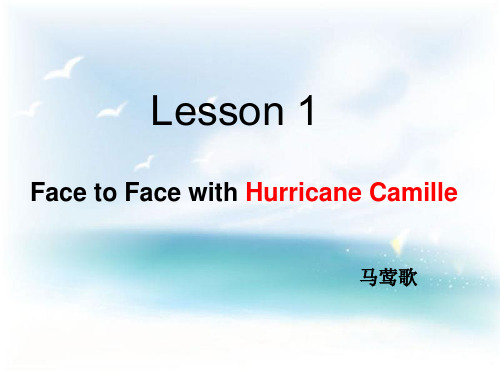
• 2、The little crowd of mourners -- all men and boys, no women--threaded their way across the market place between the piles of pomegranates and the taxis and the camels, walling a short chant over and over again. (P2)
Lesson 1
Face to Face with Hurricane Camille
马莺歌
Figures of speech
1. "We can batten down and ride it out," he said. (Para. 4) metaphor 2. Wind and rain now whipped the house. (Para. 7) personification 、metaphor 3. The children went from adult to adult like buckets in a fire brigade. (Para.11) simile
6. “We can batten down and ride it out,” he said. 封舱 安然度过
采取果断行动以迎接困难
7. The men methodically prepared for the hurricane. 有条理地
8. …asked if she and her two children could sit out the storm with the Koshaks.待到结束
高考英语读后续写之修辞手法第2讲

树上的小鸟在树上唱着美妙的歌曲。
• 3. The frogs are giving a concert---mixed chorus.(景物描写) • 青蛙在举办音乐会---混声大合唱。
• 4.Fireflies patrol the grass with small lanterns (景物描写) • 萤火虫提着小灯笼在草丛中巡逻。
参考答案:1. 拟人 2. 拟人 3. 夸张
高考英语读后续写之修辞手法第2讲
高考英语读后续写之修辞手法第2讲
找出下面句子里面的修辞 1. The loud music almost drove me up a wall. 2. The night gently lays her hand at our feverd heads. 3. The volcano spit out lava from its mouth.
高考英语读后续写之修辞手法第2讲
高考英语读后续写之修辞手法第2讲
Part 4:使用介词短语
• 1. She went home in a flood of tears.(情感描写) • 她泪如泉涌地回家去了。 • 类似表达:She shed floods of tears. • 2. When they told the news, I was over the moon/ on the top of the world.
高考英语读后续写之修辞手法第2讲
ห้องสมุดไป่ตู้
高考英语读后续写之修辞手法第2讲
Part 2:使用动词
• 1. The young girl brought the house down with her perfomance. • 这位年轻姑娘的表演博得了满堂喝彩。 • 2. It made me jump out of my skin. (情感描写) • 吓得我魂不附体。 • 3.I almost laughed my head off.(情感描写) • 我都快笑死了。 • 4. My blood froze.(情感描写) • 我的血液都凝固了。 • 5. She cried her eyes out. (情感描写) • 她痛哭涕流。 • 6. It brought her heart into her mouth.(情感描写) 让她的心悬到了嗓子眼。
英语修辞赏析
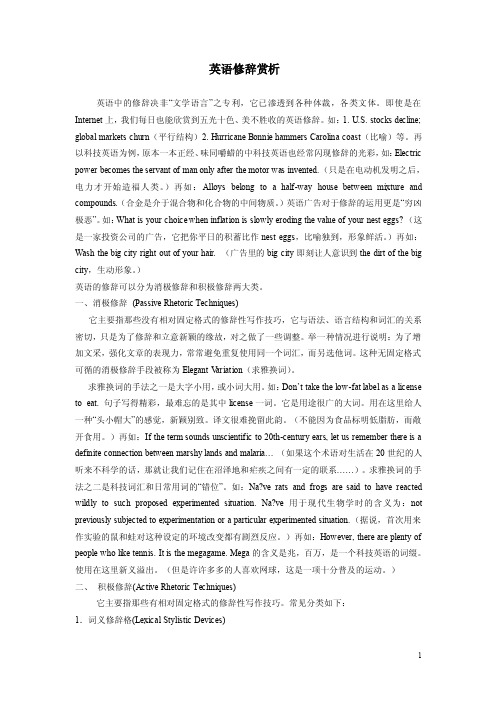
英语修辞赏析英语中的修辞决非“文学语言”之专利,它已渗透到各种体裁,各类文体。
即使是在Internet上,我们每日也能欣赏到五光十色、美不胜收的英语修辞。
如:1. U.S. stocks decline; global markets churn(平行结构)2. Hurricane Bonnie hammers Carolina coast(比喻)等。
再以科技英语为例,原本一本正经、味同嚼蜡的中科技英语也经常闪现修辞的光彩,如:Electric power becomes the servant of man only after the motor was invented.(只是在电动机发明之后,电力才开始造福人类。
)再如:Alloys belong to a half-way house between mixture and compounds.(合金是介于混合物和化合物的中间物质。
)英语广告对于修辞的运用更是“穷凶极恶”。
如:What is your choice when inflation is slowly eroding the value of your nest eggs? (这是一家投资公司的广告,它把你平日的积蓄比作nest eggs,比喻独到,形象鲜活。
)再如:Wash the big city right out of your hair. (广告里的big city即刻让人意识到the dirt of the big city,生动形象。
)英语的修辞可以分为消极修辞和积极修辞两大类。
一、消极修辞(Passive Rhetoric Techniques)它主要指那些没有相对固定格式的修辞性写作技巧,它与语法、语言结构和词汇的关系密切,只是为了修辞和立意新颖的缘故,对之做了一些调整。
举一种情况进行说明:为了增加文采,强化文章的表现力,常常避免重复使用同一个词汇,而另选他词。
英语18种重要修辞手法
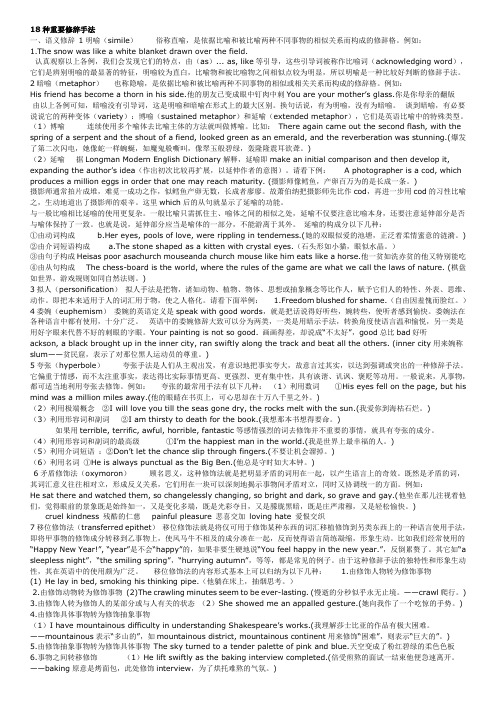
18种重要修辞手法一、语义修辞1明喻(simile)俗称直喻,是依据比喻和被比喻两种不同事物的相似关系而构成的修辞格。
例如:1.The snow was like a white blanket drawn over the field.认真观察以上各例,我们会发现它们的特点,由(as)... as, like等引导,这些引导词被称作比喻词(acknowledging word),它们是辨别明喻的最显著的特征,明喻较为直白,比喻物和被比喻物之间相似点较为明显,所以明喻是一种比较好判断的修辞手法。
2暗喻(metaphor)也称隐喻,是依据比喻和被比喻两种不同事物的相似或相关关系而构成的修辞格。
例如:His friend has become a thorn in his side.他的朋友已变成眼中钉肉中刺You are your mother’s glass.你是你母亲的翻版由以上各例可知,暗喻没有引导词,这是明喻和暗喻在形式上的最大区别。
换句话说,有为明喻,没有为暗喻。
谈到暗喻,有必要说说它的两种变体(variety):博喻(sustained metaphor)和延喻(extended metaphor),它们是英语比喻中的特殊类型。
(1)博喻连续使用多个喻体去比喻主体的方法就叫做博喻。
比如:There again came out the second flash, with the spring of a serpent and the shout of a fiend, looked green as an emerald, and the reverberation was stunning.(爆发了第二次闪电,她像蛇一样蜿蜒,如魔鬼般嘶叫,像翠玉般碧绿,轰隆隆震耳欲聋。
)(2)延喻据Longman Modern English Dictionary解释,延喻即make an initial comparison and then develop it, expanding the author’s idea(作出初次比较再扩展,以延伸作者的意图)。
英语修辞方法2

修辞方法Rhetorical Devices (2)PersonificationIt is to treat a thing or an idea as if it were human or had human qualities.1. Youth is hot and bold; Age is weak and cold. Youth is wild, and Age is tame. -----William Shakespeare2. The match will soon be over and defeat is staring us in the face.3. This time fate was smiling to him.4. Thunder roared and a pouring rain started.5. Dusk came stealthily.6. The storm was raging and angry sea was continuously tossingtheir boat.7. The sun kissed the green fields.8. The thirsty desert drank up the water.9. The youth were singing, laughing and playing the music instruments.10. The trees and flowers around them danced heartily as if touched by merry mood.11. The night, like some great loving mother, gently lays her hand at our fevered head.12. Ill-gotten wealth is but an evil friend.13. The leaves are trembling in the cold wind.14. The storm was so angry that it wanted to destroy everything in the cold wind.15. The thirsty soil drank in the rain.1.The waves were dimpling in the sunshine. (泛起笑窝)2.The green mountains were dancing, and the rivers and lakes smiling.3.The rose blushes in the morning breeze.4.Time will tell.5.On the table lay some dog-eared books.6.The wind sighed in the tree tops.7.The moon is riding in the sky.8.The lamb nodded as I came home.9.Pride goes before a fall.10.Success, health, and happiness are beckoning to you.11.Poetry is the queen of arts.12.Truth never grows old.ZoosemyOpposite to personification, it is to treat a human as an object, like an animal, a plant, an inanimate thing, or an abstract idea.1. “A lucky dog you are!” exclaimed Jim.2. Terribly hungry, the man wolfed down all the cakes.3. Children are flowers of our country.4. She found in him model and admiration.5. His spoilt children are rotten goods that will never prosper.6. Like a lion he rushed to meet his foe.7. He slept like a dog.8. The prostitutes are nothing but paper toys, played, ruined, torn, and thrown into the garbage can.9. She is shedding crocodile tears.10. Children are always eager to ape others.11. He is a bookworm.EuphemismIt is the substitution of a mild or vague expression for a harsh or unpleasant one, for example:to die to pass away, to leave us, one’s heart has stopped beating, to fall asleepold people senior citizens, gray hairmad emotionally disturbedmadhouse mental hospitalwhore working girl/call girl/business girl/pavement princessdustman sanitation workerprostitutes entertainerlavatory bathroom, men’s/women’s room, dressing room, restroom, water closet Invasion, raid military actionDriving inhabitants away or controlling them pacificationconcentration camps strategic hamletsgraveyard Memorial park; memory parkFirst Class (飞机上的豪华舱) Deluxe class/ Premium ClassSecond Class The First ClassThird Class Business Class/Economic Class/Tourist Classmake love with/ have sex with go to bed with/sleep withto be pregnant to be expectingsecondhand store resale storegarbage collector sanitation engineermaid/housekeeper domestic help/day-help/live-in help1.He is a bit slow for his age. (他反应较慢)2.He/She is a stout/plump man/woman.3.I have to p ay a call./ I’d like to be excused./ I have to retire for a moment./ whereis the restroom?/ may I wash hands?4.His father passed away last week and is going to be laid to rest next Sunday.5.“What do you think of the roast duck?”“Not bad.”6.Your grammar is not particularly good.7.They parted after two years of marriage.8.Sometimes I think she sticks too much to her principles.9.I am afraid he has misrepresented the facts.10.He used poor judgment wherever he went.11.He worked and worked until he breathed his last.12.They laid down their lives for their country.13.And, in being low water, he went out with the tide.It is obvious that those euphemisms used by the ordinary people are meant to soften harsh reality, but those used by politicians may aim at deceiving the public. Alliterationwith might and main 尽全力neck and nothing 铤而走险地rough and ready粗糙但尚能用的,卤莽但还有能力的as blind as a bat 有眼无珠as large as life 与原物一般大小;千真万确bite the bullet 死撑硬挺,啃硬骨头put into practice 实行,实施1.His writing is clear and clean. trade policy is often viewed as inconsistent, incoherent and incomprehensibleto other countries.3.Time and tide wait for no man.4.He proved to be a slow, sleepy, sluggish-brained sloth.5.They got the work through with dash and daring regardless of the cost orconsequences.6.He is huge and humorous.7.She is both small and stupid.8.My father is always healthy and happy.Overstatement and understatementIn overstatement, the diction exaggerates the subject, and in understatement, the words play down the magnitude or value of the subject. Overstatement is also called hyperbole. Both overstatement and understatement aim at the same effect: to make the statement or description impressive or interesting.1.She is dying to know what job has been assigned her.2.On hearing that he had passed the CET 6, he whispered to himself, “I am theluckiest man in the world.”3.The millionaire spent a few dollars to build this indoor pool.4.The funny stories made all the audience laugh off their head.5.His parents praised his performance to the skies.More about HyperboleThank you Thanks a millionThey laughed heartily. They almost died laughing.I am hungry. I am starving.1. From his mouth flowed speech sweeter than honey.2. So great is he that the sun’s brilliance seemed dim by comparison.3. The two sisters are different in a thousand and one ways.4. In the spring I have counted one hundred and thirty-six kinds of weather inside offour-and-twenty hours. (Mark Twain)More about Understatement1. That is no laughing matter. (That’s a serious matter.)2. She was not without ambition. (She was quite ambitious.)3. This piece of work is nothing to be proud of. (It is disgraceful.)4. Sorry, this is in fact more than I can promise. (I cannot promise.)Transferred EpithetAn epithet is an adjective or descriptive phrase that serves to characterize somebody or something. A transferred epithet is one that is shifted from the noun it logically modifies to a word associated with that noun. When one says that he has had a busy day, one is using a figure of speech. For it is the person, not the day, that is busy.“移就修饰”/“转移修饰”/“移就”。
英语修辞和赏析
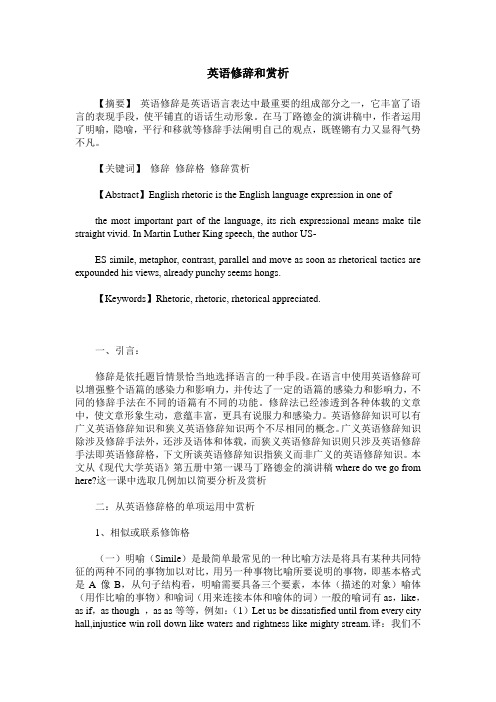
英语修辞和赏析【摘要】英语修辞是英语语言表达中最重要的组成部分之一,它丰富了语言的表现手段,使平铺直的语话生动形象。
在马丁路德金的演讲稿中,作者运用了明喻,隐喻,平行和移就等修辞手法阐明自己的观点,既铿锵有力又显得气势不凡。
【关键词】修辞修辞格修辞赏析【Abstract】English rhetoric is the English language expression in one ofthe most important part of the language, its rich expressional means make tile straight vivid. In Martin Luther King speech, the author US-ES simile, metaphor, contrast, parallel and move as soon as rhetorical tactics are expounded his views, already punchy seems hongs.【Keywords】Rhetoric, rhetoric, rhetorical appreciated.一、引言:修辞是依托题旨情景恰当地选择语言的一种手段。
在语言中使用英语修辞可以增强整个语篇的感染力和影响力,并传达了一定的语篇的感染力和影响力,不同的修辞手法在不同的语篇有不同的功能。
修辞法已经渗透到各种体载的文章中,使文章形象生动,意蕴丰富,更具有说服力和感染力。
英语修辞知识可以有广义英语修辞知识和狭义英语修辞知识两个不尽相同的概念。
广义英语修辞知识除涉及修辞手法外,还涉及语体和体载,而狭义英语修辞知识则只涉及英语修辞手法即英语修辞格,下文所谈英语修辞知识指狭义而非广义的英语修辞知识。
本文从《现代大学英语》第五册中第一课马丁路德金的演讲稿where do we go from here?这一课中选取几例加以简要分析及赏析二:从英语修辞格的单项运用中赏析1、相似或联系修饰格(一)明喻(Simile)是最简单最常见的一种比喻方法是将具有某种共同特征的两种不同的事物加以对比,用另一种事物比喻所要说明的事物,即基本格式是A 像B,从句子结构看,明喻需要具备三个要素,本体(描述的对象)喻体(用作比喻的事物)和喻词(用来连接本体和喻体的词)一般的喻词有as,like,as if,as though ,as as等等,例如:(1)Let us be dissatisfied until from every city hall,injustice win roll down like waters and rightness like mighty stream.译:我们不会感到满意除非某个市政府里公平如浪涛滚滚,正义如江河滔滔。
张汉熙高级英语2修辞讲解

特点:把本应该用来描述甲事物性质 状态的定语用去形容乙事物,而乙事物却根 本不具备这种性质或功能。
1.Instantly, from the dark holes all round, there was a frenzied rush of Jews... 2.The condescending view from the fiftieth floor of the city’s crowds below cuts these people off from humanity. 3.She has expensive tastes in clothes
A figure of speech in which a thing, quality, or idea is represented as a person.
(WNWD)
Personification (拟人)是把物当作人来描写的一 种修辞方法,具体用法是把通常仅用于描写人 的各类词语用于描写物,赋予各种“物”
Simile A figure of speech in which one thing is likened to another, in such a way as to clarify and enhance an image. It is explicit comparison (as opposed to the metaphor where comparison is implicit) recognizable by the use of words “like” or “as”.
Metaphor(暗喻) A figure of speech containing an implied comparison, in which a word or phrase ordinarily and primarily used of one thing is applied to another.
有关英语的修辞表达剖析

一.相似或关联修辞格(figures of resemblance or relationship)(一)allegory ['ælɪg(ə)rɪ](讽喻;寓言)(二)allusion [ə'luːʒ(ə)n; -'ljuː-](引喻)(三)analogy [ə'nælədʒɪ(类比;比拟)(四)animism ['ænɪmɪz(ə)m](比拟;卡通法;动画法)(五)antonomasia [,æntənə'meɪzɪə; æn,tɒnə-] (借代;换称)(六)conceit [kən'siːt](比附比喻)(七)dysphemism ['disfimizəm](贬损;贬抑)(八)enallage [en'ælədʒɪ](替换)(九)euphemism ['juːfəmɪz(ə)m](委婉)(十)fable ['feɪb(ə)l](寓言)(十一)homericsimile(荷马风格式明喻)(十二)kenning ['kenɪŋ](迂说)(十三)metalepsis [,metə'lepsɪs](借代;转义)(十四)metaphor(隐喻)(十五)metaphor(1)deadmetaphor(融合隐喻终休隐喻)(十六)metaphor(2),alivemetaphor(鲜活隐喻)(十七)metaphor(3),extendedmetaphor(延展隐喻)(十八)metaphor(4),mixedmetaphor(矛盾隐喻)(十九)metaphor(5),metaphorofsuccessionwithoutconfusion(协调隐喻)(二十)metaphor(6),personal(anthropomorphic)metaphor(拟人隐喻)(二十一)metaphor(7),submergedmetaphor(潜性隐喻)(二十二)metaphor(8),organicmetaphor(象征隐喻)(二十三)metaphor(9),telescopedmetaphor(联珠隐喻)(二十四)metaphor(10),sustainedmetaphor(强进隐喻)(二十五)metaphor(11),diminishingmetaphor(玄学派隐喻)(二十六)metonymy(借代;换喻)(二十七)parable(比喻;寓言)(二十八)personification(拟人)(二十九)personification(1)prosopopoeia(拟人)(三十)personification(2)patheticfallacy(拟人)(三十一)personification(3),apostrophe(呼语)(三十二)personification(4)invocation(呼求;乞灵;祈求)(三十三)phanopoeia(示现)(三十四)simile(明喻)(三十五)simile(1),epicsimile(史诗明喻)(三十六)simile(2),homericsimile(荷马风格式明喻)(三十七)synecdoche(借代;提喻)(三十八)trope(比喻)强调或含蓄修辞格(figuresofemphasisorunder-statement)(一)adynation(玄乎夸张)(二)asyndeton(连词省略)(三)adversativeasyndeton(反意连词省略)(四)amplification(渲染夸张)(五)anastrophe(倒装)(六)anticlimax(突降)(七)antiphrasis(倒词)(八)antistoichon(对照)(九)antithesis(对照)(十)aphorism(格言;警句)(十一)apophasis(阳舍阴取;欲取姑舍)(十二)apostrophe(呼语)(十三)invocation(呼求;乞灵)(十四)autoclesis(阳舍阴取;欲取姑舍)(十五)auxesis(夸张)(十六)bathos(突降;弄巧成拙)(十七)climax(阶升)(十八)contrast(比较;反衬)(十九)correction(补充)(二十)pairingsynonym(同义词配搭)(二十一)epanorthosis(补充;补证)(二十二)epigram(隽语)(二十三)jeud’esprit(隽语)(二十四)euphuism(尤菲绮斯体;绮丽体)(二十五)exaggeration(夸张)(二十六)exergasia(尤菲绮斯体;绮丽体)(二十七)hyperbaton(倒装)(二十八)hyperbole(夸张)(二十九)innuendo(暗贬;暗讽)(三十)inversion(倒装)(三十一)irony(悖反)(三十二)irony(1),verbalirony(措辞悖反反语)(三十三)irony(2),situationalirony(情况悖反)(三十四)irony(3),dramaticirony(戏剧性悖反)(三十五)irony(4),tragicirony(悲剧性悖反)(三十六)irony(5),comicirony(喜剧性悖反)(三十七)irony(6),cosmicirony(命运悖反)(三十八)irony(7),theironyoffate(命运悖反)(三十九)irony(8),worldirony(命运悖反)(四十)irony(9),philosophicalirony(命运悖反)(四十一)irony(10),romanticirony(浪漫性悖反)(四十二)irony(11)socraticirony(苏格拉底式悖反)(四十三)irony(12),rhetoricalirony(措词悖反;反语)(四十四)irony(13),dialecticalirony(辩证悖反)(四十五)litotes(含蓄肯定;含蓄悖反)(四十六)meiosis(含蓄陈述)(四十七)negation(含蓄肯定)(四十八)oxymoron(矛盾修饰;精警)(四十九)paradox(矛盾隽语;警策)(五十)paraleipsis(假省略真强调)(五十一)paralepsis(假省略真强调)(五十二)paralipsis(假省略真强调)(五十三)preterition(假省略真强调)(五十四)sarcasm(讽刺)(五十五)satire(讽刺;嘲讽)(五十六)satire(1)horatiansatire(贺拉斯式讽刺)(五十七)satire(2)juvenaliansatire(朱维诺尔式讽刺)(五十八)satire(3)indirectsatire(间接讽刺)(五十九)syncrisis(比较;对照)(六十)syneciosis(对照;反衬)(六十一)systrophe(定义堆累)(六十二)tapinosis(明夸暗损)(六十三)understatement(含蓄陈述)(六十四)vision(示现)三.语音修辞格(figuresofsound)(一)alliteration(头韵)(二)assonance(准押韵)(三)consonance(谐音)(四)dissonance(噪音)(五)repetition(重复)(六)repetition(1),anadiplosis(尾首重复;联珠;顶针)(七)repetition(2)anaphora(首语重复)(八)repetition(3),antanaclasis(原词多义)(九)repetition(4),catchwordrepetition(尾首重复;联珠;顶针)(十)repetition(5),chiasmus(颠倒重复)(十一)repetition(6),correction(矫正重复)(十二)repetition(7),cumulation(同意重复)(十三)repetition(8),echo(回声重复)(十四)repetition(9),epanadiplosis(首词尾复)(十五)repetition(10),epanalepsi(嵌插重复)(十六)repetition(11),epanaphora(首语重复)(十七)repetition(12),epanastrophe(尾首重复)(十八)repetition(13),epanodos(逆转重复)(十九)repetition(14),epanorthosis(矫正重复)(二十)repetition(15),epidiplosis(首词尾复)(二十一)repetition(16),epiphora(尾语重复)(二十二)repetition(17),epistrophe(尾语重复)(二十三)repetition(18),epizeuxis(紧接重复)(二十四)repetition(19),gemination(紧接重复)(二十五)repetition(20)gradation(尾首重复;层递重复)(二十六)repetition(21)identicalrhyme(原词押韵)(二十七)repetition(22),incrementalrepetition(歌谣重复;悬念重复)(二十八)repetition(23),ploce(原词多义;同语新义)(二十九)repetition(24),palilogy(紧接重复;嵌插重复)(三十)repetition(25),paregmenon(同源重复)(三十一)repetition(26),regression(逆转重复)(三十二)repetition(27),symploce(首语、尾语合并重复)(三十三)repetition(28),polyoptoton(转化重复)(三十四)repetition(29),tautology(累赘重复)(三十五)repetition(30),refrain(叠句重复)(三十六)onomatopoeia(摹声)(三十七)melopoeia(音响辅义)四.文字游戏修辞格(verbalgame andgymnas-tics )(一)ambiguity(意中寓意;双关)(二)anagram (拆词命意)(三)antistrophe(同语颠倒重复)(四)doubleentendre(黄色双关)(五)hendiadys(双词单意)(六)hypallage(移就)(七)palindrome(回文)(八)parody(仿拟)(九)paronomasia(双关)(十)portmanteauword(熔合词)(十一)prolepsis(预言示现)(十二)pun(双关)(十三)quibble(双关)(十四)quip(双关)(十五)reverse(易位)(十六)syllepsis(1)(一词多叙)(十七)syllepsis92)(兼顾)(十八)transferredepithet(移就)(十九)zeugma(拈连)五误用收效修辞格(rhetoricalexploitationoferrors)(一)anachronism(超前夸张)(二)bull(言辞矛盾)(三)catachresis(滥用比喻)(四)circumlocution(迂曲)(五)malapropism(误换)(六)metathesis(音位转换)(七)mimesis(模仿)(八)periphrasis(迂曲)(九)spoonerism(字母误换)六.描绘性词语(descriptivewords)(一)bulk(体积描摹)(二)characteristicapposition(特征性同位语)(三)descriptivewords(描写性词语)(四)epexegesis(诠注)(五)epithet(属性词语)(六)homericepithets(荷马式属性词语)英语同源修辞格是一种特殊的重复修辞手法。
英语修辞鉴赏2

• What happens to a dream deferred? • Does it dry up Like a raisin葡萄干 in the sun? Or fester化脓 like a sore --- And then run --Does it stink like rotten meat? • Or crust 结成硬壳and sugar结成颗粒状 over -• Like a syrupy sweet? • Maybe it just sags 下垂 • Like a heavy load. • Or does it explode? • (Langston Hughes: A dream deferred)
• I learned a great many new words that day. I do not remember what they all were; but I do know that 'mother, father, sister, teacher' were among them ---words that were to make the world blossom for me 'like Aaron's rod, with flowers‘. (Helen Keller) • 那天我学了非常多的字。我不记得究竟是哪些, 其中的母亲、父亲、妹妹和老师我倒是记得; 这些字让我的世界变成花样美好,就像摩西的 兄长亚伦,拥有的那根长满花叶和果实的神杖 (Aaron‘s rod)。
• ...there was a secret meanness that clung to him almost like a smell. • (Carson McCullers) • (The suggestion of an all-prevailing meanness in the man.) • He was like a cock who thought the sun had risen to hear him crow. • (George Eliot) • 他傲得像只公鸡,以为太阳升起便是为了听它 打鸣。 • (The suggestion of overwhelming conceit 自 负 in the man.)
英语读后续写修辞手法---暗喻教案

英语读后续写修辞手法(二)Metaphor(暗喻)一、定义本体、喻体都出现,中间常用喻词"是"、"变成"等连接,有时不用喻词。
暗喻的典型形式为:甲是乙。
但不是所有由“是”连接的语句都是暗喻,因为比喻必须要符合:①甲和乙必须是本质不同的事物,②甲乙之间必须有相似点。
比明喻更简练、含蓄。
例如:He is a walking dictionary.She is a living encyclopedia(百科全书).Education is farming.Some books are to be tasted, others swallowed, and some few to be chewed and digested。
Teach a fish to swimLearning is going on a journey.Anger is a fire that makes your blood boil.He’s a wolf in sheep’s clothing.Time is a flying arrow/a burning match/flowing water/a travelling train.二、类别1.喻体直述式:把本体和喻体说成是一件事。
A book that is shut is but a block.总是合着的书只不过是一块砖头而已。
College is a comma of a sentence of life. 大学就是人生长句的一个逗号。
My heart is a lonely hunter that hunts on a lonely hill. 我的心就像一名孤独的猎手,在寂寞的山岗游猎。
2. 喻体半隐式He doesn’t have an idea of his own. He just parrots what other people say. 他没有自己的观点,只会鹦鹉学舌。
高级英语2修辞总结

高级英语2修辞总结(总5页) -本页仅作为预览文档封面,使用时请删除本页-Lesson 1 Pub Talk and the King’s English1. Alliterationthe King’s English slips and slides (Para. 18)2. Allusions 暗指,引喻--musketeers of Dumas (Para. 3)--descendants of convicts (Para. 7)--Saxon churls (Para. 8)--Norman conquerors (Para. 8)3. ExaggerationPerhaps it is because of my upbringing in English pubs that I think bar conversation has a charm of its own. (Para. 3)4. Metaphor1. No one has any idea where it will go as it meanders or leaps and sparkles or just glows. (Para. 2)2. They got out of bed on the wrong side is simply not a concern. (Para. 3)3. Suddenly the alchemy of conversation took place (Para. 4)4. The glow of the conversation burst into flames. (Para. 6)5. The conversation was on wings. (Para. 8)6. We ought to think ourselves back into the shoes of the Saxon peasant. (Para. 11)7. The Elizabethans blew on it as on a dandelion clock, and its seeds multiplied, and floated to the ends of the earth. (Para. 14)8. I have an unending love affair with dictionaries. (Para. 17)9. Even with the most educated and the most literate, the King’s English slips and slides in conversation. (Para. 18)10. “the sinister corridor of our age…” (Para. 18)11. Otherwise one will bind the conversation, one will not let it flow freely here and there. (Para. 20)12. We would never have gone to Australia, or leaped back in time to the Norman Conquest. (Para. 20)5. Simile1. They are like the musketeers of Dumas who, although they lived side by side with each other, did not delve in to each other’s… (Para. 3)2. The Elizabethans blew on it as on a dandelion clock,…(Para. 14)Lesson 2 MarrakechSimile1. The burying-ground is merely a huge waste of hummocky earth, like a derelict building-lot. (Para. 2)2. ,…sore-eyed children cluster everywhere in unbelievable numbers, like clouds of flies. (Para. 8)3. …where the soil is exactly like broken-up brick. (Para. 18)4. Long lines of women, bent double like inverted capital Ls (Para. 18)5. …their feet squashed into boots that looked like blocks of wood… (Para. 23)6. ,…glittering like scraps of paper. (Para. 26)Metaphor1. They rise out of the earth, …(Para. 3)2. Down the center of the street there is generally running a little river of urine. (Para. 8)Alliterationsweat and starve (Para. 3)Transferred Epithet--there was a frenzied rush of Jews (Para. 10)Onomatopoeia, winding up the road with a clumping of boots and a clatter of iron wheels (Para. 22) Synecdoche1. a white skin is always fairly conspicuous (Para. 16)2. , actually has feelings of reverence before a white skin. (Para. 24)Rhetorical Question1. Are they really the same flesh as your self Do they even have names Or are they merely a kind of differentiated brown stuff, about as individual as bees or coral insects (Para. 3)2. How much longer can we go one kidding these people How long before they turn their guns in the other direction (Para. 25)UnderstatementI am not commenting, merely pointing to a fact. (Para. 21)Lesson 3 Inaugural Address (January 20, 1961)Parallelism…, symbolizing an end as well as a beginning, signifying renewal as well as change. (Para. 1)Paras. 6, 7, 8, 10, 11Alliteration1. …friend and foe alike… (Para. 3)2. to assure the survival and the success of liberty. (Para. 4)3. steady spread (Para. 13)4. …bear the burden… (Para. 22)5. …strength and sacrifice…Metaphor1.…those who foolishly sought power by riding the back of the tiger ended up inside. (Para. 7)2. But this peaceful revolution of hope cannot become the prey of hostile powers. (Para. 9)3. this hemisphere intends to remain the master of its own house. (Para. 9)4. to strengthen its shield of the new and the weak… (Para. 10)5. And if a beachhead of cooperation may push back the jungle of suspicion… (Para.19)6. The energy, the faith, the devotion which we bring to this endeavor will light our country and all who serve it, and the glow from that fire can truly light the world. (Para. 24)Consonance…, whether it wishes us well or ill,… (Para. 4)Synecdoche…both rightly alarme d by the steady spread of the deadly atom….(Para. 13) Antithesis1. United, there is little we cannot do in a host of cooperative ventures. Divided, there is little we can do, for we dare not meet a powerful challenge at odds and split asunder. (Para. 6)2. If a free society cannot help the many who are poor, it cannot save the few who are rich. (Para. 8)3. And so, my fellow Americans, ask not what your country can do for you; ask what you can do for your country. (Para. 25)Repetitionall forms of (Para. 2)the belief (Para. 2)Regression1. Let us never negotiate out of fear, but let us never fear to negotiate. (Para. 14)2. And so, my fellow Americans, ask not what your country can do for you; ask what you can do for your country. (Para. 25)Allusionone hundred days (Para. 20)ClimaxAll this will not be finished in the first one hundred days. Nor will it be finished in the first one thousand days, nor in the life of this Administration, nor even perhaps in our lifetime on this planet. (Para. 20)Hyperbolehour of maximum danger (Para. 24)Lesson 4 Love is a FallacyMetaphor1. Charles Lamb, unfettered the informal essay with.... “Dream’s Children”. (Author’s Note)2. There follows an informal essay....frontier. (Author’s Note)3. Logic, far from being a dry, pedantic discipline, is a living, breathing thing, full of beauty, passion, and trauma. (Author’s Note)4. My brain, that precision instrument, slipped into high gear. (Para. 17)5. In other words, if you were out of the picture, the field would be open. (Para. 31)6. I fought off a wave of despair. (Para. 76)7. Maybe somewhere in the extinct crater of her mind, a few embers still smoldered. Maybe somehow I could fan them into flame. (Para. 95)8. The next fallacy is called Poisoning the Well. (Para. 112)9.”The first man has poisoned the well before anybody could drink from it. He has hamstrung his opponent before he could even start.” (Para. 116)10. The rat! (Para. 148)Simile1. My brain was as powerful as a dynamo, as precise as a chemist’s sc ale, as penetrating as a scalpel. (Para. 1)2. Same age, same background, but dumb as an ox. (Para. 2)3. First he looked at the coat with the expression of a waif at a bakery window. (Para.47)4. He looked like a mound of dead raccoons. (Para. 54)5. ...the raccoon coat huddled like a great hairy beast at his feet. (Para. 94)6. It was like digging a tunnel. (Para. 120)7. I leaped to my feet, bellowing like a bull. (Para. 144)Antithesis1. “It is, after all, easier to make a beautiful dumb girl smart than to make an ugly smart girl beautiful.” (Para. 24)2. “Back and forth his head swiveled,desire waxing, resolution waning.” (Para. 47)3. If there is an irresistible force, there can be no immovable object. If there is an immovable object, there can be no irresistible force. (Para. 91)4. “Look at me--a brilliant student..ing from.” (Para. 150)Hyperbole1. Logic, far from being a dry, pedantic discipline, is a living, breathing thing, full of beauty, passion, and trauma. (Author’s Note)2. My brain was as powerful as a dynamo, as precise as a chemist’s scale, as penetrating as a scalpel. (Para. 1)3. It’s not often that one so young has such a giant intellect. (Para. 2)4. Finally he didn’t turn away at all; he just stood and stared with mad lust at the coat. (Para. 47)5. You are the whole world…of outer space (Para. 132)6. “I will wander the face of the earth, a shambling, hollow-eyed hulk.” (Para. 132) Metonymy1. But I was not one to let my heart rule my head. (Para. 20)2. Otherwise you have committed a Dicto Simpliciter. (Para. 70)3. You are guilty of Post Hoc if you blame Eula Becker. (Para. 79)LitotesThis loomed as a project of no small dimensions. (Para. 58)SynecdocheThere is a limit to what flesh and blood can bear. (Para. 112)AnalogyJust as Pygmalion loved the perfect woman he had fashioned, so I loved mine. (Para. 122)Transferred EpithetI said with a mysterious wink and closed my bag and left. (Para. 37)Rhetorical QuestionCould Carlyle do more Could Ruskin (Authors’ Note)“Really” said Polly, amazed. “Nobody” (Para. 73)Who knew (Para. 95)Lesson 5 The Sad Young MenMetaphor:1. …we had reached an international stature that would forever prevent us from retreating behind the artificial walls of a provincial morality… (Para. 2)2. battle for success (Para. 3)3. And like most escapist sprees, this one lasted until the money ran out, until the crash of the world economic structure at the end of the decade called the party to a halt and forced the revelers to sober up and face the problems of the new age. (Para. 4)4. …once the young men had received a good taste of twentieth-century warfare. (Para. 6)5. …they had outgrown town and families (Para. 6)6. …in sleepy Gopher Prairies all over the country (Para. 6)7. …to add their own little matchsticks to the conflagration of “flaming youth” (Para. 8)8. …now began to imitate the manners of their elders and play with the toys of vulgar rebellion. (Para. 8)9. …was the rallying point of sensitive persons disgusted with America. (Para. 9)10. …b ut since the country was blind and deaf to everything save the glint and ring of the dollar,…(Para. 9)Personification:…the country was blind and deaf to everything…dollar…. (Para. 9)Metonymy:1. …our young men began to enlist under foreign flags. (Para. 5)2. Greenwich Village set the pattern. (Para. 7)3. …their minds and pens inflamed against war,…(Para. 7)4. …to add their own little matchsticks to the conflagration of “flaming youth” (Para. 8)5. Before long the movement had become officially recognized by the pulpit…(Para. 8)6. …but since the country was blind and deaf to everything save the glint and ring of the dollar,…(Para. 9)Transferred epithet:The slightest mention of the decade brings nostalgic recollections to the middle-aged and curious questionings by the young…(Para. 11)Simile:The war acted merely as a catalytic agent in this breakdown of the Victorian social structure… (Para. 3)。
英语修辞学Lecture 2
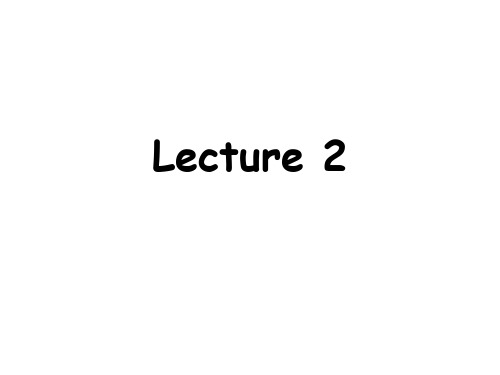
The diamond department was the heart and center of the store.
以下为英语Metaphor的常见运用格式: 1. 名词型 E.g All the world’s a stage, and all the men and women merely players. Money is a bottomless sea, in which honour, conscience, and truth may be drowned.
(三)、用as if或as though表示比喻关系 seem 虚拟句型, 最常见的是as if/though Eg: He was a beautiful horse that looked as though he had come out of a painting by Vealsquez.
(3)用remind…of表示比喻关系 本体与喻体之间以“remind…of”作桥梁,把二者 联系起 来,触景生情。 1.She reminds me of a tigress 2.His nose was particularly white and his large nostrils,correspondingly dark,reminds me of an oboe when they dilated. 3.These red roses remind him of his lovely and dear wife ten years ago.
英语Metaphor的运用格式灵活多样,它可以体现在任何句 子成分上,如主语、谓语、表语、定语、宾语或状语。在表 达上它可以是一个单词、一个词组或一个句子,甚至是一个 段落。 E.g Hope is a good breakfast, but it is a bad supper. Some books are to be tasted, others swallowed, and some few to be chewed and digested. German guns and German planes rained down bombs, shells and bullets...
- 1、下载文档前请自行甄别文档内容的完整性,平台不提供额外的编辑、内容补充、找答案等附加服务。
- 2、"仅部分预览"的文档,不可在线预览部分如存在完整性等问题,可反馈申请退款(可完整预览的文档不适用该条件!)。
- 3、如文档侵犯您的权益,请联系客服反馈,我们会尽快为您处理(人工客服工作时间:9:00-18:30)。
• In the Bible story, God chose Aaron to be his priest by making his rod or stick sprout overnight. “It had budded, blossomed, and produced ripe almonds杏!") • (The suggestion of the magical effect the discovery of language ("words") had on the blind girl: it opened up a whole new world of knowledge and happiness for her.
• What happens to a dream deferred? • Does it dry up Like a raisin葡萄干 in the sun? Or fester化脓 like a sore --- And then run --Does it stink like rotten meat? • Or crust 结成硬壳and sugar结成颗粒状 over -• Like a syrupy sweet? • Maybe it just sags 下垂 • Like a heavy load. • Or does it explode? • (Langston Hughes: A dream deferred)
• 当美梦延期到达 一切将会怎样? 会干涸么 • 就像烈日下干瘪的葡萄一样? 会痛楚么 • 然后远远逃开? • 会腐朽么? • 或者伪装坚强 • 就像水果硬糖一样? • 也许 它只是下陷了 • 像一段塌陷的公路一样 • 或者 它会爆炸而消亡?
• The suggestion of what might happen if hopes and dreams are not realized: • a. they might just wither and dry up; • dry up like a raisin • b. they might cause pain and suffering and poison one's whole outlook on life; • fester like a sore; stink like rotten meat • c. they might remain sweet memories; • crust and sugar over Like a syrupy sweet
Her lips were red, her looks were free自然的,优美的, Her locks 头发were yellow as gold. Her skin was white as leprosy麻风, The nightmare Life-in –Death was she Who thicks man’s blood with cold.
• I learned a great many new words that day. I do not remember what they all were; but I do know that 'mother, father, sister, teacher' were among them ---words that were to make the world blossom for me 'like Aaron's rod, with flowers‘. (Helen Keller) • 那天我学了非常多的字。我不记得究竟是哪些, 其中的母亲、父亲、妹妹和老师我倒是记得; 这些字让我的世界变成花样美好,就像摩西的 兄长亚伦,拥有的那根长满花叶和果实的神杖 (Aaron‘s rod)。
• 2.1.2 Main uses of simile: descriptive, illuminative and illustrative • 1) Descriptive • Pure description of persons, things, places, natural scenery, and action has always been the chief use to which similes have been put. • A good descriptive simile can draw sharper pictures in the mind than could possibly be done by any other means, and with much more brevity.
• ...there was a secret meanness that clung to him almost like a smell. • (Carson McCullers) • (The suggestion of an all-prevailing meanness in the man.) • He was like a cock who thought the sun had risen to hear him crow. • (George Eliot) • 他傲得像只公鸡,以为太阳升起便是为了听它 打鸣。 • (The suggestion of overwhelming conceit 自 负 in the man.)
• • • •
(2) Day after day, day after day, We stuck, nor breath nor motion; As idle as a painted ship Upon a painted ocean.
An association between the absolute immobility of the becalmed ship on a real ocean and the perfect stillness of a ship in a painting, destined to remain in the same place forever.
•
• • • • • • •
To make the comparison, words like ‘as, as…so’, and ‘like’ are used to transfer the quality that we associate with one to the other. Sometimes the association is made between unfamiliar and familiar things, or between abstract and concrete things. The stronger the association that is felt, the greater the force of comparison, The stronger the power of suggestion and The sharper the image produced.
He (Preble) looked at the clock. The big second hand was sweeping down like a guillotine (断头台). • (Pat Frank) • The association here is between the rapid downward movement of the second hand, and the rapid and relentless movement downward of a guillotine on a man's head. • The suggestion is of the relentless passing away of time, every second bringing Preble nearer to his moment of decision.
(1) And then the whining schoolboy, with his satchel and shining morning face, creeping like snail unwillingly to school. 然后是背着书包,满面红光的学童,像蜗牛一样 慢吞吞地拖着脚步,不情不愿地呜咽着上学 堂。 (an association between the slow pace of the reluctant schoolboy and the snail’s crawl.)
• d. they might remain a burden on one's mind, dull and heavy, • sags like a heavy load • or e. they might foster resentment and ultimately lead to violence and rebellion. • explode
• • • •
II. Figures of similarity 2.1 Simile 2.1.1definition A simile is a figure of speech which makes a comparison between two unlike elements having at least one quality or characteristic in common. • The comparison is purely imaginative, that is, the resemblance between the two unlike things in that one particular aspect exists only in our minds, in our ‘inward eye’ and not in the nature of the things themselves.
